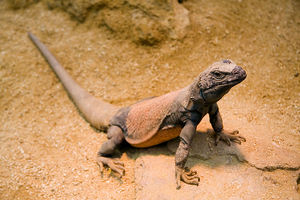Difference between revisions of "Chuckwalla"
| (5 intermediate revisions by 3 users not shown) | |||
| Line 1: | Line 1: | ||
| − | {{ | + | {{unfinished}} |
| − | [[Image:Chuckwalla.jpg|300px|thumb|right|''' ''Sauromalus obesus | + | [[Image:Chuckwalla.jpg|300px|thumb|right|''' ''Sauromalus obesus at Frankfurt Zoo'' ''']] |
Scientific name: ''Sauromalus obesus'' | Scientific name: ''Sauromalus obesus'' | ||
| Line 25: | Line 25: | ||
They also require a high light level so consider using more than one UV tube. | They also require a high light level so consider using more than one UV tube. | ||
| − | |||
| − | |||
| − | |||
| − | |||
| − | |||
| − | |||
| − | |||
| − | |||
| − | |||
| − | |||
| − | |||
[[Category:Lizard_Species|C]] | [[Category:Lizard_Species|C]] | ||
| − | |||
Revision as of 13:39, 2 April 2010
| This article is still under construction. |
Scientific name: Sauromalus obesus
Description
Chuckwallas are large, herbivorous iguanids. Adults may reach a total length of 45 cm. They are very stout and flattened dorsoventrally. Often drab looking they vary in colour from dull orange-brown to olive or black. The short rounded tail may be ringed with black and white bands. The skin is rough and granular. Chuckwallas are able to inflate their bodies by gulping air. Large specimens can inflict a nasty bite.
Range
Western North America; most arid areas of southwest U.S.A. and Mexico. Chuckwallas prefer rocky country that provides shelter and food.
Diet
Mainly herbivorous. A wide variety of food items should be offered. Leafy dark greens (collards, mustards, dandelions, escarole, parsley, grasses), shredded green and orange vegetables, soft fruits, flowers (such as hibiscus, roses, dandelions, nasturtium, geranium). Cactus pads and prickly pear. Supplement.
Enclosure
Desert environment. Large enclosure. Clean sand to a depth of 7.5 cm. Flat rock for basking; plenty of rocks and crevices, structures for hiding (at least one in cool area and one in warm area). Place a small dish of water in the coolest corner. Very low humidity is vital.
Temperature
Chuckwallas require a temperature gradient of 28-38ºC. They require at least 32ºC for digestive system metabolism. The basking temperature can be up to 45ºC.
They also require a high light level so consider using more than one UV tube.
